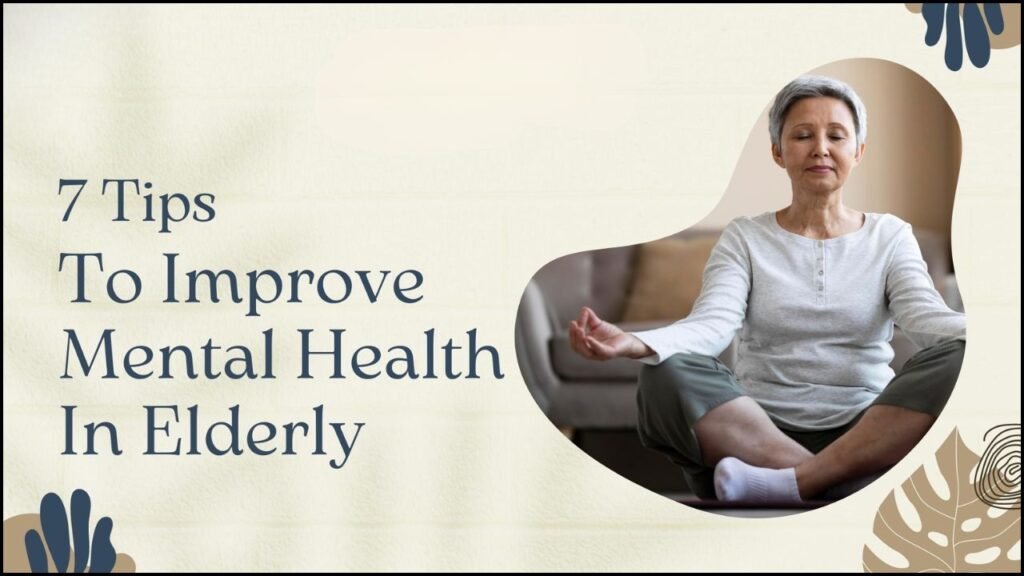
Mental health is just as important as physical health, especially for older adults. Many elderly people face loneliness, stress, memory issues, and anxiety due to retirement, loss of loved ones, or physical weakness. Mental well-being directly impacts the quality of life. A healthy mind helps older people stay active, connected, and positive. This article provides useful and practical tips designed specifically to improve and maintain mental health in the elderly.
Social Engagement
Staying socially active improves emotional well-being.
- Daily interaction with family, neighbors, or friends builds a sense of belonging.
- Joining community groups like senior clubs or religious gatherings provides support and friendship.
- Volunteering helps seniors feel useful and respected in society.
- Phone or video calls with children and relatives reduce feelings of isolation.
Physical Activity and Exercise
Movement keeps both the body and brain healthy.
- Morning walks in parks give fresh air and natural light.
- Gentle exercises like yoga or tai chi improve flexibility and calm the mind.
- Stretching routines keep joints active and promote relaxation.
- Dancing or gardening adds fun and improves mood.
Balanced Diet and Hydration
A proper diet supports brain health.
- Fresh fruits and vegetables provide essential vitamins and antioxidants.
- Omega-3-rich foods like walnuts and fish support memory and focus.
- Low sugar and salt intake prevents blood pressure and mood swings.
- Plenty of water helps with concentration and reduces fatigue.
Regular Sleep Routine
Sleep affects mood, memory, and focus.
- Sleeping 7–8 hours restores mental energy and reduces irritability.
- Maintaining a sleep schedule helps the body feel rested.
- Avoiding screen time before bed improves sleep quality.
- Warm milk or light reading before sleep calms the mind.
Mental Stimulation
Active minds remain sharper and happier.
- Reading newspapers or books improves thinking and vocabulary.
- Solving puzzles like Sudoku or crosswords enhances memory.
- Learning new skills, such as knitting or painting, boosts self-worth.
- Attending workshops or lectures keeps the mind alert and informed.
Emotional Expression
Bottling emotions can harm mental health.
- Sharing feelings with family or counselors eases emotional pain.
- Writing a journal allows safe expression of thoughts.
- Crying when needed brings emotional relief.
- Engaging in prayer or meditation promotes inner peace.
Technology Use
Technology helps in staying connected and informed.
- Video chats help elderly people see and talk to distant family.
- Mental health apps provide relaxation and memory games.
- Online communities allow seniors to find others with shared interests.
- Telehealth services make professional help accessible from home.
Routine and Purpose
A structured day creates focus and contentment.
- Daily routines give a sense of direction and productivity.
- Weekly goals provide motivation and excitement.
- Spending time with grandchildren brings joy and purpose.
- Adopting a pet can reduce loneliness and create responsibility.
Spiritual Practices
Spirituality provides emotional support.
- Reading religious texts gives strength during difficult times.
- Attending services or prayers builds community connection.
- Meditation and chanting bring calmness and emotional balance.
- Belief in a higher power helps reduce fear of illness or death.
Mental Health Practices and Their Benefits
| Activity | Mental Health Benefit |
|---|---|
| Talking to friends daily | Reduces loneliness and improves mood |
| Gentle morning walks | Increases energy and reduces depression |
| Eating fish and nuts | Improves memory and brain function |
| Sleeping on schedule | Reduces anxiety and improves focus |
| Solving puzzles | Sharpens the mind and delays memory loss |
| Writing in a diary | Helps process emotions and reduce stress |
| Joining a hobby class | Builds confidence and social connection |
| Using video calls | Keeps family bonds strong |
| Volunteering | Builds self-worth and creates purpose |
| Practicing meditation | Calms the mind and brings emotional balance |
Signs of Mental Distress in the Elderly
| Warning Sign | Explanation |
|---|---|
| Withdrawal from others | Avoiding conversations or gatherings regularly |
| Forgetting familiar tasks | Difficulty remembering known routines or names |
| Constant sadness | Showing no interest in daily activities |
| Sudden anger or irritation | Overreacting to minor issues or people |
| Appetite changes | Eating too much or too little without reason |
| Poor hygiene | Neglecting grooming or cleanliness |
| Sleep problems | Trouble falling asleep or waking up frequently |
Tips to Handle Mental Health Crises
- Contact a doctor immediately if symptoms of depression or memory loss worsen.
- Keep emergency contacts visible and accessible at home.
- Ensure regular health check-ups to detect any mental or physical changes early.
- Encourage open conversation to prevent feelings from building up.
Role of Family in Supporting Elderly Mental Health
| Family Actions | Impact on Elderly |
|---|---|
| Spending daily quality time | Strengthens emotional bonds |
| Involving elders in decisions | Builds respect and value |
| Praising their achievements | Increases confidence and happiness |
| Encouraging them to talk | Reduces stress and improves communication |
| Arranging social visits | Impact on the Elderly |
Useful Activities for Mental Upliftment
- Nature walks for relaxation
- Music therapy to bring back happy memories
- Watching light-hearted movies to laugh and relax
- Reading spiritual or motivational books for inner strength
- Celebrating festivals to feel connected with tradition and culture
Closing Perspectives
Mental wellness plays a vital role in the overall health of elderly people. Small efforts, supportive families, and positive routines can bring great improvements. With a balanced lifestyle and emotional support, elderly individuals can enjoy peace, purpose, and happiness in their later years. Every elderly person deserves respect, love, and good mental health care.









